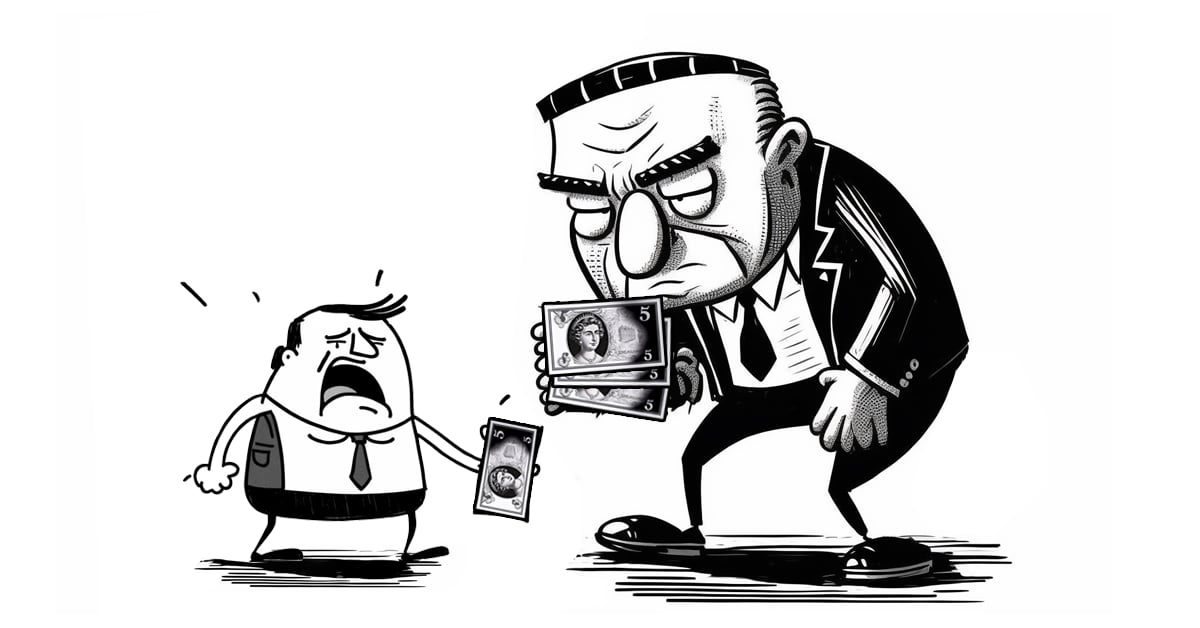The entire system is broken and customers are suffering You only have to look at the Trustscores...
What is CPI+ pricing and why is it so damaging?

Customers distrust broadband providers for good reason. The list of legitimate griefs is long. But misleading pricing tactics are the most harmful and demand further investigation.
The latest tactic Big Broadband deploy against customers is a contractual annual price increase scheme called “CPI+” pricing. It is as technical and complex as it sounds.
It’s a stealth “broadband tax” levied on customers to increase corporate profits.
Worse, it’s not perpetrated by a solitary bad actor. Multiple legacy broadband providers have piled onto this gravy train. Today, 6 out of the largest 7 providers deploy an above-inflation pricing tactic. That means over 18.9 million customers pay this broadband tax.
This broadband tax isn’t small, either. The average BT broadband customer, for example, will pay an extra £1,467 over their tenure (7.5 yrs). In all, Legacy Providers plan to collect an extra £13.4 billion over the same period.
And somehow, Big Broadband gets away with it.
Customers rarely understand these contractual clauses - and why should they? People just want to buy broadband, not moonlight as amateur economists. If customers did understand the true impact of these contracts, they would never sign them. If regulators understood their true impact, they would outlaw them.
First, what is “CPI+”?
Let’s start by explaining CPI. CPI is short for Consumer Prices Index. This is the rate at which the prices of goods and services bought by households rise and fall over time. In other words, it measures the rate of inflation.
CPI is calculated by the Office for National Statistics (ONS). They look at over 700 goods and services and measure price movements at approximately 20,000 outlets within the UK. These data points provide the ONS enough information to determine the rate of inflation.
In simple terms, CPI tells you if you are paying more or less for the same goods and services at different times. When the inflation figure is positive, you are paying more. Right now, inflation is very high, meaning the price you pay today for the same good or service is much higher than what you paid a year ago.
The “+” is what I call a stealth “broadband tax”. This is a pre-set amount determined by a business and has no relation to the economy or inflation. It simply represents how much higher the price increase that businesses want to force into their contracts. It is expressed as a percentage, just like CPI.
“CPI+” is the combination of these two concepts. When a business deploys “CPI+” pricing in their contracts, they create a formula for how to calculate the annual price increases. One part of the equation is variable and determined by the economy (“CPI”), and one component is pre-set by the business (“+”).
Example 1: BT (The Overlord of “CPI +”)
Each year, BT increases the price of their broadband by CPI + 3.9%. To calculate their annual price increase, BT uses the December 12-month CPI rate published by the ONS in January.
In 2022, the December 12-month CPI figure was 10.5%. To calculate their 2023 price increase, BT took the CPI figure of 10.5% and added their added tax of 3.9%, resulting in an annual price increase of 14.4%.
The vast majority of BT’s broadband customers in 2023 will incur this 14.4% price increase. They have no choice. Customers have to accept it because it was written into their contracts.
To be fair, BT does write “CPI + 3.9%” in their broadband contracts. They also have a web page, if you search for it, that outlines how this mechanism works. I am not accusing BT of misinforming or lying to their customers.
The problem is BT does not show customers the financial impact of this pricing scheme. Very few customers understand these concepts to start with - and who has the time to read the small print on basic utilities anyway? Even fewer spend the time to model Bank of England inflation forecasts to properly see the impact these pricing schemes have to their bank accounts.
Where does the “+” go?
This is where the malice comes in. The “+” goes straight to profit. This means corporations like BT can use it to pay dividends to their shareholders and obscene multi-million-pound executive bonuses.
It is money that goes from the pockets of customers into the pockets of shareholders and executives. It is legal (for now), but it is very wrong.
They blame inflation but the stealth “broadband tax” is not going to suppliers. That is what the CPI component covers.
The “broadband tax” is not going to employees either. That is also covered by the CPI component. Unfortunately for BT employees, their wages didn’t increase by inflation anyway. Their wages only increased by around 5% on average, resulting in a real wage decrease, which is why they held a strike last October, the first time BT employees have staged industrial action in 35 years.
These employees clearly understand the unfair dynamics at play, but customers are kept completely in the dark.
How does it impact you?
“CPI +” pricing guarantees that the price of your broadband increases, by a lot, every year, in perpetuity. This is for two main reasons: inflation is high; and over time your bills increase exponentially even if CPI is 0.
As you have likely read, the UK is experiencing its highest inflation in 40 years. As mentioned earlier, the December 12-month CPI figure was 10.5%. The last time inflation was above 9% was in 1982. It is not expected to drop to the Bank of England target of 2.0% anytime soon.
Since CPI is high, “CPI +” pricing means your broadband price increases are even higher.
BT, EE, Plusnet, and Vodafone customers face a 14.4% price increase starting in April, 2023. Ouch!
Don’t worry, you’re not alone if you didn’t know any of this. I remember speaking to a senior Ad Exec who mentioned he had BT broadband. I mentioned BT’s 2022 price increase and he scoffed. He said I didn’t know what I was talking about, I was making it up, and he would have known if his prices went up that much. I showed him the BT webpage that explains this pricing scheme and asked him to check his bank account to see his latest direct debit. He fell silent. He realised in that very moment that he was being taken advantage of by a company to which he had been a loyal customer. Smart guy, totally fooled by his provider.
How big a deal is this?
Very big. Based on my calculations, £13.4 billion big.
Take the average broadband contract of £45 a month and in just three years it’s suddenly over £60. Over 7.5 years (the average tenure of a broadband customer) that really adds up.
Yes, you read those numbers correctly.
Who’s cleaning up from all this?
-png.png)
Yes, you read those numbers correctly. No, you don’t have to put up with it.
What does Rebel do differently?
We don’t do “CPI +” pricing because we don’t believe in taxing loyal customers.
We do price fairly, which means we don’t overprice to make excess profit on each customer.
We believe fair and transparent pricing creates trust between ourselves and our customers. We recognise that trust is earned and that it has been violated by Big Broadband. We commit to working with our customers in a fair and transparent way.
What should you take away from all this?
The UK is experiencing a recession, consumers are enduring a cost-of-living crisis, and Big Broadband providers are slated to increase the bills of 18.9 million customers by 14%.
The worst part is that customers don’t know this is happening to them. Legacy providers cloak a severely harmful price increase scheme in confusing and impenetrable economic jargon.
We believe:
-
Contractual above-inflation price increase schemes should be illegal
-
Every customer currently trapped in one of these schemes should be able to immediately cancel without penalty anytime
So, spread the word. If you read this far, now you know. Please spread this message, repost this article, and help educate your family and friends.
It is a tough world right now. Don’t let Big Broadband make it even tougher.




